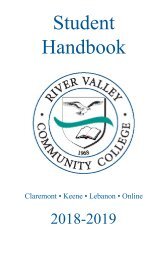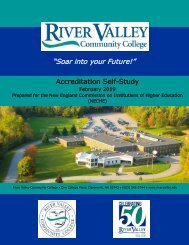You also want an ePaper? Increase the reach of your titles
YUMPU automatically turns print PDFs into web optimized ePapers that Google loves.
Finance Staff<br />
<strong>RVCC</strong> ensures that it has sufficient professionally qualified finance staff which includes a<br />
full-time Bursar and Senior Accounting Technician and a part-time Student Account<br />
Representative led by a Chief Business Affairs Officer. The BAO holds an MBA and is a<br />
Certified Public Accountant with over 20 years of experience. Prior to coming to <strong>RVCC</strong> in<br />
August of 2016, the BAO spent time at a large, Ivy-league college; at public schools; and<br />
as an auditor for both national and local firms. The organizational chart outlines the<br />
oversight of the financial staff by the BAO, who also serves on the extended leadership<br />
team at <strong>RVCC</strong>.<br />
Budgetary Transparency<br />
At <strong>RVCC</strong>, departments have input into their own budgets. Initial requests are generated<br />
by the faculty and staff themselves who understand what is required to ensure student<br />
needs are being met. Every semester the BAO presents the current financial positon to the<br />
faculty and staff at the All-College Staff Meeting. The BAO gets daily updates from CCSNH<br />
on financial information as well as credits sold so information related to revenue and<br />
expenses can be evaluated daily. On a bi-monthly basis, the BAO updates the President<br />
and senior administration on <strong>RVCC</strong>’s financial status and creates a budget projection and<br />
expense report for review.<br />
The BAO also presents the Financial Position of the College at every Advisory Council<br />
meeting.<br />
Response to Unexpected Budgetary Changes<br />
Increased transparency in the budget has helped departments to understand not only their<br />
own needs, but the needs of other departments. As a result, if one department is in need<br />
of new equipment, but does not have any more financial resources, funds are reallocated<br />
to enable the department in need to get the required equipment/materials. In the Spring<br />
of 2017, the Science and the Medical Lab Technician program combined resources to<br />
purchase $868.40 of microorganisms and chemicals for lab supplies. Because the MLT<br />
budget was already allocated to other required programmatic expenses, the Science<br />
department utilized excess monies they had and paid for a majority of the supplies. This<br />
sharing of resources ensured that the MLT program would have the needed supplies for<br />
the Pathogenic Microbiology course. In another example, in the summer of FY18, it was<br />
discovered that the Medical Lab Technician program microscopes had not been serviced<br />
and many were in a state of disrepair. This was an unplanned expense and there were not<br />
enough funds in the program’s budget to address this need. Upon learning of the need,<br />
the BAO, with permission of the President, reallocate Allied Health funds to accommodate<br />
the needs of the program and ensure that the microscopes were ready for the beginning of<br />
the fall semester.<br />
Budgetary Oversight<br />
The Board of Trustees, CCSNH, and <strong>RVCC</strong> administration all ensure oversight of the<br />
financial resources and ethical practices of the College. There is an internal auditor at<br />
CCSNH that oversees each college, and an external auditor examines CCSNH annually.<br />
Additionally, CCSNH underwent a Legislative Bureau Audit. This Audit highlighted a<br />
number of areas of concern which were addressed by the current administration and have<br />
106 | P a g e





